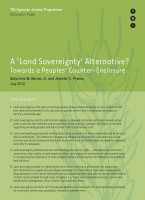A ‘Veritable Revolution’ The Land Restitution Law and the Transformation of Rural Colombia
Regions
This report looks into the new land restitution law, which Santos portrays as integral to Colombia’s ‘veritable revolution’, against the backdrop of agrarian policy in Colombia historically.

Downloads
Authors
Executive Summary
For the past three decades, economic liberalisation backed by paramilitarism in Colombia has been driving demand for land, and with it land speculation, resulting in the most dramatic cycle of land grabbing in the country’s history. Between 1980 and 2010, an estimated 6.8 million hectares changed hands according to the government agency Acción Social, with agroindustry, mining and oil companies steadily taking over areas where small farmers once grew food crops.
Against this backdrop, the recently passed “Victims and Land Restitution Law” was declared by the Santos Government to be the means by which victims of the armed conflict and forced displacement could finally receive reparation and restitution for crimes committed against them. Not only has the initiative been widely hailed in the international community, including by the United Nations, the United States and the European Union, it has also been applauded by palm oil, sugarcane and cattle industry elites inside Colombia – the very groups that have benefitted from previous land grabbing.
This report looks into the new land restitution law, which Santos portrays as integral to Colombia’s ‘veritable revolution’, against the backdrop of agrarian policy in Colombia historically. This analysis exposes the economic agenda behind the land law. The authors argue that the new law is a cynical attempt to exploit popular support for agrarian reform and for the victims of displacement, in order to: secure property rights for business interests; establish the permanence of industries that have benefitted from displacement; alter the nature of Colombia’s rural economy in the interest of agro-industrial projects; and facilitate future investment in Colombian land and resources.
Mechanisms within the law are set to ensure that businesses which benefitted from the past cycles of displacement will remain unaffected. For example, where victims return to their land to find a business operating, they are obliged to become part of the government’s economic model for rural areas, based on resource extraction and agro-industry. This impunity for the “displacers” is matched by ever more obstacles to justice for the displaced, particularly peasant farmers who may want to reclaim their land.
Meanwhile, in the context of wider economic policies, the restitution process, where it functions, is likely to result in transfer of land ownership to large businesses and corporations, from small scale farmers unable to survive in an environment skewed heavily against them. As Colombian officials have stated, the Restitution Law is not a stand-alone piece of legislation, but one component of a broader set of policies to “modernise” rural Colombia. This modernisation is accompanied by a civil-military strategy, the principal objective of which is to “maintain the confidence of investors and to put on one line military efforts and economic development in strategic areas of the national territory.”
The law is likely to operate as a means of stabilising property titles whilst transferring land -- from peasants unable to sustain their livelihoods as traditional farmers, to large businesses possessing the necessary capital to exploit the land. The US-based Businessweek quotes Alejandro Reyes, Director of Colombia’s Rural Land Institute, who expresses the core objective: to reduce the risks that had been spooking investors.
Moritz Tenthoff is based in Colombia and since 2005 has been working with indigenous, farmer and afrocolombian communities through national and international human rights organizations. He has published for several Spanish, English, Dutch and Belgian media.
Ross Eventon is an independent writer and researcher based in Latin America. His analyses have been published by NGOs, think-tanks and a number of outlets focusing on international politics.
Both authors previously held the position of Samuel Rubin Young Fellow at the Transnational Institute in Amsterdam.
